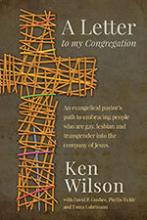A letter to my congregation: An evangelical pastor’s path to embracing people who are gay, lesbian and transgender into the company of Jesus.
By Ken Wilson. Read the Spirit Books, 2014.
Into the fevered and polarizing debates about churches responding to those who are same-sex attracted comes a clear, compassionate and discerning voice, that of Ken Wilson’s in A letter to my congregation. The subtitle, An evangelical pastor’s path to embracing people who are gay, lesbian and transgender into the company of Jesus, lets us know where the path took him. Hopefully that will not dissuade readers from exploring his journey, for he offers his reflections with due diligence and humility.
Wilson is an evangelical pastor and founder of Vineyard Church in Ann Arbor, Michigan, where he had served for nearly forty years at the time of the book’s writing. As a seasoned pastor, he draws on a number of disciplines to discern a Christian response to the increasing numbers of congregants he pastored who were coupled in same-sex relationships and eager to participate in the life of the church. These disciplines include careful Bible study, personal experience, prayer and other spiritual practices.
Framing his response in the form of a letter to his congregation provides a glimpse into the privilege, joy and agony of being a pastor. Pastors are in the thick of people’s lives and asked to speak a (or the) word of God at such times.
Wilson writes, “My occupation as a pastor forces me to step into my calling as part of the royal priesthood (to speak of God’s will) whether I want to or not, to wrestle with (such difficult questions.” At points, he offers useful comparisons between the current situation of responding to same-sex attracted couples and that of pastoral care to those who are divorced and seeking remarriage.
He opens the chapter on the Bible’s “prohibitive texts” by declaring his commitment to the authority of scripture, adding, “I have invested too much of my life in seeking to be faithful to that witness to abandon it now.” He also reminds us, “Jesus . . . had a way of reading Scripture that was surprising, unconventional, and paradoxical.” The tensions of scriptural authority and Jesus-modeled openness frame his walk through this section. It is to his credit that he maintains his commitment to both.
His detailed walk through relevant scriptures includes careful, essential attention to their historical context, concurring with professor John Walton who says, that “the Bible was written for us . . . [b]ut it wasn’t written to us.” After twenty-some pages, Watson wryly notes, “This level of detail is difficult to fit into a thirty-five minute sermon. If you’ve made it through the dizzying array of details . . . you are a highly motivated reader. And your eyes are glazing over.” The author concludes that same-sex attraction where two people live in a covenanted relationship of equals was unknown in biblical times.
In summary, in this disputed matter, Wilson invites Christians to give themselves over to the unity uniquely found in Jesus, grounding his conclusion on an extended discussion of Paul’s counsel in Romans 14-15. The disputed matter there—differing views on faithful ethics—was as contentious and divisive as those we encounter. Wilson proclaims, “Paul is passionate about the unity of the church because Jesus demonstrates a powerful lordship as he holds a diverse community together without force. He does so by the power of the crucified messiah, received by the church and demonstrated in her life together, harbinger of the coming kingdom of God” (paraphrased).
Perhaps Wilson is not as successful at offering “a third way” through the polarizing debates on same-sex attraction as he attempts to be, but his extensive, thoughtful journey is one that sheds light on the path many of us are walking, and well worth the read.
Melissa Miller is a Manitoba pastor and regular columnist of Canadian Mennonite.



Add new comment
Canadian Mennonite invites comments and encourages constructive discussion about our content. Actual full names (first and last) are required. Comments are moderated and may be edited. They will not appear online until approved and will be posted during business hours. Some comments may be reproduced in print.